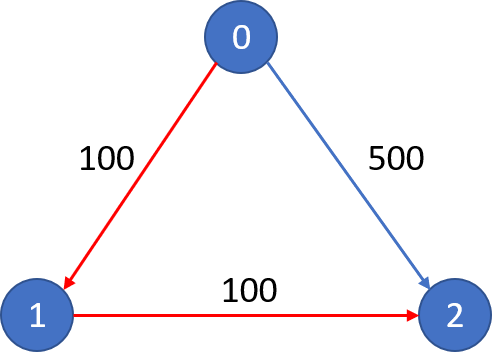787. Cheapest Flights Within K Stops
There are n cities connected by m flights. Each flight starts from city u and arrives at v with a price w.
Now given all the cities and flights, together with starting city src and the destination dst, your task is to find the cheapest price from src to dst with up to k stops. If there is no such route, output -1.
**Example 1:**
Input:
n = 3, edges = [[0,1,100],[1,2,100],[0,2,500]]
src = 0, dst = 2, k = 1
Output: 200
Explanation:
The graph looks like this:

The cheapest price from city 0 to city 2 with at most 1 stop costs 200, as marked red in the picture.
**Example 2:**
Input:
n = 3, edges = [[0,1,100],[1,2,100],[0,2,500]]
src = 0, dst = 2, k = 0
Output: 500
Explanation:
The graph looks like this:

The cheapest price from city 0 to city 2 with at most 0 stop costs 500, as marked blue in the picture.Constraints:
- The number of nodes
nwill be in range[1, 100], with nodes labeled from0ton- 1. - The size of
flightswill be in range[0, n * (n - 1) / 2]. - The format of each flight will be
(src,dst, price). - The price of each flight will be in the range
[1, 10000]. kis in the range of[0, n - 1].- There will not be any duplicated flights or self cycles.
# @lc code=start
using LeetCode
function find_cheapest_price(n::Int, flights::Vector{Vector{Int}}, src::Int, dst::Int, K::Int)
graph = [Dict{Int, Int}() for i in 1:n]
for flight in flights
graph[flight[1]][flight[2]] = flight[3]
end
cost = fill(typemax(Int) >> 1, n)
cost[src] = 0
changed = [src]
for i in 1:K+1
tmp = Int[]
for new_s in changed
for (s_to_t, st_cost) in graph[new_s]
if cost[s_to_t] > st_cost + cost[new_s]
cost[s_to_t] = st_cost + cost[new_s]
push!(tmp, s_to_t)
end
end
end
changed = tmp
end
return (cost[dst] == typemax(Int) >> 1) ? -1 : cost[dst]
end
# @lc code=endfind_cheapest_price (generic function with 1 method)
This page was generated using DemoCards.jl and Literate.jl.



